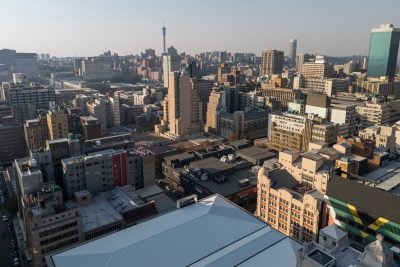What is your assessment of the Nigerian telecoms sector?
You only need to go back to the last 20 years to see that Nigeria has made enormous strides in the telecoms industry. I remember when you had to pay N20,000 ($47.87) to get a Subscriber Identity Module (SIM) card. I remember when we only had 100,000 fixed lines. We have done incredibly well. We have a fast-growing telecoms market and a large subscriber base with a lot of room to grow the data sector.
However, although we have a huge subscriber base, data penetration is still lacking. Access to high-speed internet is still lacking. Data is still relatively expensive compared to people’s wallet size. Access to smartphones is equally challenging.
If these areas are addressed, we will leapfrog into the next phase of the telecoms revolution because everything around financial inclusion, banking the unbanked, relies on high-speed internet access. That is something that is still lacking.
There is still very, very patchy fibre connection across the nation, and without adequate fibre optic connectivity, you cannot guarantee high-speed internet access. We are talking about the Internet of Things, 5G – the next revolution relies on huge data, which can only be powered by high-speed fibre optic cables.
A large part of the population can hardly afford mobile phones and other accessories. What action should operators take to make the tools needed by subscribers more affordable?
A telecoms operator can partner with a handset provider, for example. In many countries, you don’t pay 100% of the cost of the device on purchase, you enter into a subscription service. That is what makes it easy.
Or the cost of the handset can be deducted and taken from your mobile subscription on a daily basis – like $0.3 or $0.5 a day.
In India, when Reliance Jio appeared, they rolled out cheap smartphones and flooded the market. You might see some of that in Nigeria in due course.
eNaira stumbles despite regulatory push
Ten months after the launch of the Central Bank of Nigeria (CBN) digital currency, the eNaira, in October last year, not much has changed in terms of its value-addition to the e-payment space.
Assessment shows that 34,000 transactions have been recorded on the eNaira platform, amounting to circa N188m ($450,000), which many analysts describe as an under-performance.
Like other central bank digital currencies (CBDCs), the eNaira was created to serve as a medium of exchange and store of value for consumers and businesses. It is expected to expand Nigeria’s payment options, boost financial inclusion, reduce the cost of processing cash and facilitate transparent welfare payments.
However, Adekunle Moses, a civil servant based in Lagos, said what the eNaira can do is also being carried out elsewhere: “I do not see any significant difference between the e-Naira wallets and the payment channels in banks and that’s why most people have abandoned the platform.”
To make eNaira a success, the IMF has called on the CBN to strengthen Nigeria’s national ID systems and make know-your-customer (KYC) requirements easily enforceable as integration of the currency into the payment ecosystem continues.
Is the telecoms sector attracting sufficient FDI?
Capital importation relates to equity investment. If you are a mature business, you are not going to get equity investment, you already have the equity you need. What you are looking for is access to debt finance.
So, while the likes of MTN did not get equity investment, they are raising a lot of money from the local market. If you are a mature market, you look at the telco, if you are a developing market, you will look at telco infrastructure.
Do you see the competition for payments between telcos and banks as healthy?
Absolutely. I think both the banks and telcos have a part to play. The key objective should be that whatever we can do to deepen financial inclusion, deepen access to financial services – whether it is through telcos or the banks – should be encouraged.
That is what the regulators are trying to do across the Nigeria Communication Commission (NCC) and Central Bank of Nigeria (CBN). Which is why they licensed the Payment Service Banks, in recognition of the fact that telcos do have a role to play, and the banks also have a role to play.
If you look at the emerging trends in the banking sector, the banks are also recognising that their payment platforms are separate businesses, and are creating a framework to exploit that separate platform.
We have seen GTBank with DabariPay, we have seen Access Bank with SwiftPay, Ecobank with Swift Process. These are payment platforms that are embedded within the banks, and they are creating Holding Company (HoldCo) structures to allow them to attract investment into that space to exploit that part of their business.
Telecoms companies, especially the very big players, are declaring huge profits despite complaints of poor-quality services. Does that imply that the profits declared are not real?
I think they are real. It is also clear to everybody that it is a challenging operating environment. But of course, the numbers speak for themselves.
MTN and Airtel are public listed companies, and Nigerians are shareholders in these companies. So, the better they do, the better it is for the Nigerian shareholders, Nigerian Exchange Limited and the Nigerian economy.
I would say that it is a testament to the resilience of the management of those companies, and to their credit, that they are able to deliver good results in spite of the challenging operating environment that we have.
Some telcos are granting airtime credit to subscribers, who will pay later. Do you think that such a product offering is sustainable, given the high credit default rate in Nigeria?
I cannot speak of the details of their operations, but I can imagine that for any product that offers a credit facility of sorts, there is always a calculation of the default rate that you could build into your assumptions.
If you are to lend to a provider, to finance say 100 people, perhaps less than 10% per cent of those people will default; therefore, the thinking is that if the majority of the people pay, with that calculation it should be fine.
Want to continue reading? Subscribe today.
You've read all your free articles for this month! Subscribe now to enjoy full access to our content.
Digital Monthly
£8.00 / month
Receive full unlimited access to our articles, opinions, podcasts and more.
Digital Yearly
£70.00 / year
Our best value offer - save £26 and gain access to all of our digital content for an entire year!
 Sign in with Google
Sign in with Google 



